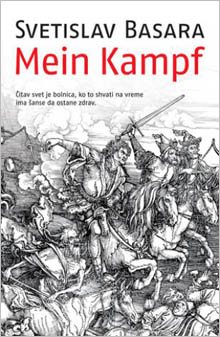
‘There are either heroes or enemies, with no in-between. There is no room for indulgence or softness – just demands, judgments and relentlessness.’ How war makes a taboo of pleasure and the erotic.
Serbia’s neo-fascist political establishment is the target of Svetislav Basara’s satirical novel Mein Kampf, from which not even the country’s modernizing figures emerge unscathed. Not surprisingly, the reaction has been one of irritation, writes Ivan Telebar.
Svetislav Basara
Mein Kampf
(Laguna, Belgrade, 2011)
Fascism has taken over the world. At least according to Kramberger, the narrator and main character of Svetislav Basara’s latest novel Mein Kampf – a book that unreservedly criticizes and condemns the modern variations of fascism in Serbia, although “elements of fascism can be found in every nation”. Basara holds the entire Serbian political system at gunpoint, whose different sides unite under a common prefix after the fall of the former regime. Nothing has really changed; under the guise of democracy, yet another totalitarian system enters the stage and people do not recognize the deceit of “multi-party dictatorship”. The Serbian nation is simultaneously perpetrator and victim, because “the historical meaning of the Serbian national doctrine and the Serbian state constitute the genocide of the Serbian people”. This intra-Serbian fascism coincides with a caste system gone topsy-turvy, where shudras turn to brahmans, and pariahs are still untouchable, but in a completely different way. This is the modern social and political reality in Serbia, criticized by the author through the voice of Kramberger.
The title of the novel is daring, to say the least. At first, it is not very clear why Basara chose to name his novel after the most controversial book of the twentieth century. In the end, however, it makes perfect sense, as the book is conceived as an image of Serbian fascism. Kramberger (Basara) writes a new, anti-fascist Mein Kampf to bury the Nazism of the original in the “depths of the collective unconscious”.
 The framework for Basara’s indictment of fascism is a simple plot and the structure is subordinate to the anti-fascist discourse, which is what makes the novel remarkable. In an over-crowded hospital room, Kramberger waits to get his discus hernia treated. He spends his time talking to a certain Aprcovic, who is severely ill with prostate cancer. The dialogue between the two patients dominates all other parts of the text and clearly formulates the author’s disgust with Serbia’s fascist legacy. One of the symbols of the perverted political system has infiltrated that very hospital room, even though he is actually healthy. His name is Drempetic and he exemplifies the “one-cell organism” of Serbian fascism. Thanks to his brown nosing and connections he has been able to nest where he does not belong. He is only one of many sub-species of upstarts that Kramberger thoroughly despises, and the two fight constantly.
The framework for Basara’s indictment of fascism is a simple plot and the structure is subordinate to the anti-fascist discourse, which is what makes the novel remarkable. In an over-crowded hospital room, Kramberger waits to get his discus hernia treated. He spends his time talking to a certain Aprcovic, who is severely ill with prostate cancer. The dialogue between the two patients dominates all other parts of the text and clearly formulates the author’s disgust with Serbia’s fascist legacy. One of the symbols of the perverted political system has infiltrated that very hospital room, even though he is actually healthy. His name is Drempetic and he exemplifies the “one-cell organism” of Serbian fascism. Thanks to his brown nosing and connections he has been able to nest where he does not belong. He is only one of many sub-species of upstarts that Kramberger thoroughly despises, and the two fight constantly.
Yet Drempetic gets light treatment in comparison to the fury unleashed by the storyteller at the agents of fascist ideology in Serbia. His half-monologues explicitly condemn nationalist figures, calling them by name and awarding them derogatory attributes. The Great Satan (Dobrica Cosic) and Doctor Mengele of Law (Vojislav Kostunica) are the two most exposed to the anti-fascist fire of Basara’s narrator, but he leaves out neither Vuk Karadzic nor the current “Gauleiter of the Serbian Weimar Republic” (Boris Tadic). Kramberger’s pamphlet-like discourse comes across as social and political satire and established no distance in time to what it describes – something that will certainly irritate (and already has irritated) Drempetic’s ideological lookalikes.
Basara finds fascism in every pore of Serbian society, from tourism through pharmaceutical companies and monetary policy to art. He draws interesting and witty parallels between current social phenomena and manifestations of fascism. The link between the ban on smoking and concentration camps, for instance, is not as naive as it seems. Fascism also persists in the cult of health and its institutions are described as the fortifications of modern fascism. Neither does Kramberger shy away from criticizing Christianity and the Orthodox Church tradition, where he observes some of the foundations of today’s fascism.
The narrative voice is also aware of its own fascism, in that he considers fascists to be a lower breed and that “it is easy to be an anti-fascist having defeated fascism”. Kramberger even sees himself as a Nazi in “a state of redemption, in a sickening process of denazification”.
The theological discourse of Kramberger’s neighbour Aprcovic represents the other side of the novel, which strives towards the spiritual, or is spiritual by default in its aspiration. Aprcovic wants to see the end of the world – the metastases of fascism will lead to the collapse of the entire system and he wants to witness the final defeat of this self-destructive ideology. That is the sole motive of his fight in the higher dimensions. Fascism annihilates the little that we have of the three dimensions, and spirituality is sacrificed for a better life, he complains. However, spirituality is the only advantage “the Serbian Weimar Republic” has compared to the rest of Europe. Then again, for individuals “the trouble is that they are under great pressure to fit into the nation, the pressure cooker-nation”. Therefore, their fight is futile and their battles long lost.
Svetislav Basara dissects with sharp wit the collective unconscious of the Serbian nation and its politics. The text has many autobiographic elements and the character of Kramberger is largely based on the author, which also explains the fierceness with which he attacks fascist ideology. Basara uses exaggeration and repetition of certain phrases to draw fascism even closer to absurdity. Patched-up German (Nazi) names of Serbian state bodies and political figures provide an additional boost to that effect.
The motive behind Basara’s political novel is obvious: to expose Serbian fascism and its roots. But from a literary point of view, the text is not all that interesting. Literature here serves as a medium to act politically (an to a certain extent, spiritually). Yet despite its pragmatism, this anti-fascist Mein Kampf is not a mere pamphlet, because its mission is not restrictive. Basara allows occasional narrative sidetracks to develop and carefully constructs his characters, who, each in their own way, fights for their lebensraum in Room Four at the neurology ward. Both Basara and his characters – Kramberger and Aprcovic – are aware of how futile their resistance is. But therein lies their victory.
Published 19 April 2012
Original in Croatian
Translated by
Una Krizmanic Ozegovic
First published by Novosti 10.02 2012 (Croatian version); Eurozine (English version)
Contributed by Booksa.hr © Ivan Telebar / Booksa.hr / Eurozine
PDF/PRINTSubscribe to know what’s worth thinking about.

‘There are either heroes or enemies, with no in-between. There is no room for indulgence or softness – just demands, judgments and relentlessness.’ How war makes a taboo of pleasure and the erotic.

On the documentary poetry of Jonas Mekas; multi-voiced personalism as literary genre; and the history of the Fens as ecological morality tale.